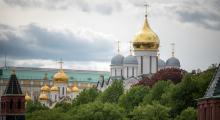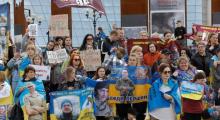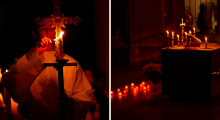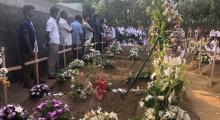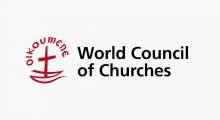Issued by the Catholic Center for Studies and Media - Jordan. Editor-in-chief Fr. Rif'at Bader - موقع أبونا abouna.org
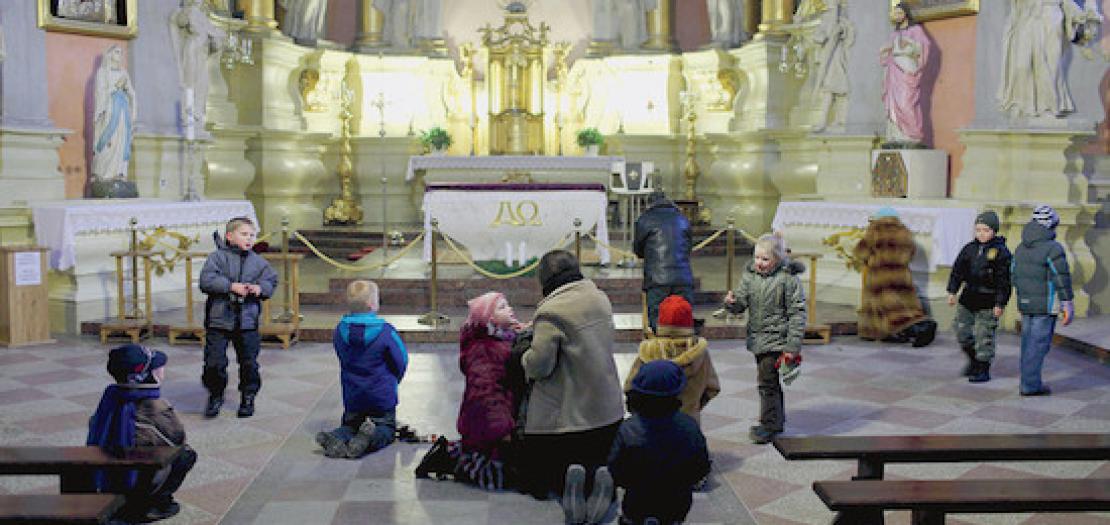
In Lithuania, which – like Estonia and Latvia – was forcibly integrated into the atheist Soviet Union, generations born before independence in 1990 were not able to pass their faith on to their children.
However, since 1990, the church workers have been striving to attract and educate young people.
In the cathedral of Kaunas several dozen students and lecturers in navy blue gowns are seated quietly in the baroque nave for the mass of the beginning of the academic year, which will be presided over by Jesuit Archbishop Lionginas Virbalas of Kaunas.
No one in this beautiful cathedral, where the pope will speak on Sunday to an audience of clergy and seminarians, is surprised by this celebration.
“It’s traditional to mark the beginning and the end of the academic year with a high Mass,” says Ingrida Kriaucionyte, director of the Pilgrims’ Welcome Center, adjacent to the cathedral.
Nonetheless, young Lithuanians are no more practicing than young people in the rest of the European Union.
“I never speak of my faith to my students. If they suspect any desire to evangelize, they immediately close up,” explains Liudas Jovaisa, a history lecturer at the University of Vilnius and a member of the Catholic Lithuanian Academy of Science.
According to Jovaisa, Lithuania had experienced massive secularization since its independence in 1990, similar to what has been happening in the West, even though, he goes on, “here, there is no hostility towards Catholicism.”
On the contrary, the Church has maintained the positive image of having been a “force of resistance” during the country’s 50 years under communist rule.
“During the Soviet takeover, the Church was the ideological enemy that had to be fought against,” says Arunus Streikus, who is also a historian and a member of the Catholic Lithuanian Academy of Science.
Priests were only allowed to celebrate the sacraments. They were punished if they tried to organize pastoral activities or catechetical meetings. All forms of faith transmission were prohibited, including within families, so as not to risk compromising children’s futures.
“The first translation of the New Testament only became available in 1972, and the first catechism in 1982,” Streikus says.
“The restriction of religious texts did more harm to our Church than the persecutions and deportations. It deprived priests and believers of education and training.”
Indeed, Archbishop Gintaras Grusas of Vilnius, said last June that “parents in Lithuania do not know the basics of the faith” and that “significant missionary and apostolic impetus is necessary.”
In order to educate the generations who have received no religious training at all, several initiatives have been launched.
In Kaunas, the young priest of the parish of St. Anthony of Padua, Father Vincentas Lizdenis, has successfully set up information sessions for parents requesting baptism of their children.
Each year, this dynamic priest also takes the 200 children who are being prepared for their first communion and their parents to Kryziu Kalnas, the Hill of Crosses, in Siauliai not far from the Latvian border. He also travels with parishioners by bus to Taizé.
“My parishioners are amazed to see so many young people praying. They are learning how to meditate and pray themselves.”
Similarly, in Vilnius, “Alpha Courses and courses for couples are being developed,” says Sister Bénédicte Rollin, a French nun of the Sisters of the Assumption. She has introduced to her parish a pastoral course for families inspired by Father Denis Sonet and du Cler.
Lithuanian Youth Day celebrations organized by the country’s seven dioceses “are going well,” according to Tomas Taskaukas, a 31-year-old family man who is associated with the Brothers of Saint John.
For the past three years, he has been the leader of a troop of the Scouts of Europe, having discovered the Christian faith at the end of his adolescence. This, he says, was thanks to “his aunt’s happy family, which made me want to live in the same way.”
Helping young Lithuanians find what they are looking for
It seems that these are the kinds of spiritual experiences that young Lithuanians are waiting for. But church workers have not always known how to respond to this.
“In the months following independence, many people flooded into the parishes,” points out Cardinal Audrys Juozas Bačkis, retired archbishop of Vilnius and former seminarian of Issy-les-Moulineaux.
“However, our clergy had no training in the pastoral and liturgical revivals. We were presenting the doctrine, but Lithuanians were thirsting for personal encounters with Christ.”
Disappointed, many turned away from religion.
Even though 79 percent of Lithuanians identify themselves as Catholics, the number of baptisms (25,000 per year) and marriages within the Church (7,000 per year) is decreasing.
Similarly, the Seminary of Vilnius (for three dioceses), which was rapidly filled after its re-founding in 1993, is emptying once more. After receiving more than 60 candidates for ordination, this year there are only 20.
As for religious instruction in state schools (compulsory in primary schools and optional in high schools), it has not always been of good quality.
“After independence, our religious instruction teacher was really bad. We didn’t listen to him because he never responded to our questions, and no discussion was allowed,” recalls Donatas Puslys, the 32-year-old editor-in-chief of the Catholic website Bernadilai, launched by the Franciscans of Vilnius in 2004.
Like other young committed Catholics, Puslys is grateful to his grandparents for having passed the Christian faith on to him. His grandfather, an organist, secretly took him to Mass.
“At Christmas time, he blessed the holy pictures that he gave us.”
Rugile Burkeviciute, 27, is a coordinator at the Jesuit high school in Kaunas.
“My grandparents had a very strong faith,” she says, “It was easy for me to believe, because this was given to me by my family.”
The Jesuits were the first to re-open private colleges in Vilnius and Kaunas in 1997. All other schools that had been private schools before the Soviet annexation, have remained state schools.
Lithuanians are, therefore, expecting great encouragement from Pope Francis’ visit on Saturday and Sunday.
“Pope John-Paul III’s visit in September 1993 transformed our relations with the state, and was of enormous help in the recovery of our churches,” points Archbishop Gintaras Grusas, the 56-year-old archbishop of Vilnius.
“For us, this visit by Pope Francis, 25 years later, is already a sign of hope in the midst of the challenges we face.”


